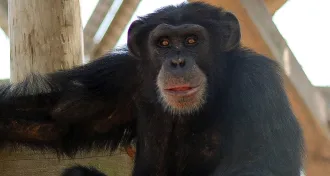All Stories
-
 Particle Physics
Particle PhysicsProton’s magnetic properties pinned down
A precise measurement of a proton’s magnetic properties could help reveal subtle differences between matter and antimatter.
By Andrew Grant -
 Health & Medicine
Health & MedicineBaby’s first bacteria arrive sooner than we thought
Forget what you’ve heard. The womb is most definitely not sterile.
-
 Animals
AnimalsZebra finches can detect variations in human speech
When humans vary the pitch or rhythm of their speech, zebra finches perceive the changes, suggesting that the ability to detect such variations is not linked to language.
-
 Paleontology
PaleontologyAge and origin of Earth’s early fossils questioned
Some of Earth's earliest trace fossils may not be fossils at all, a new study argues.
-
 Life
LifeEbola vaccine shows promise for saving apes
Results of a clinical trial suggest that vaccination of wild apes could protect them from infectious diseases.
-
 Life
LifeStarchy foods more filling than fiber, lab tests suggest
Tests of gut microbe digestion of potato starch and fiber suggest that moving away from grass-heavy ancestral diets may not be the reason for obesity epidemic.
-
 Animals
AnimalsNew salamander stays young at heart
A new salamander species was long mistaken for the juvenile form of another.
-
 Plants
PlantsIsland life prompts evolution of larger plant seeds
In 40 species of plants, the island versions of seeds were larger than mainland counterparts, perhaps to keep the seeds from being lost at sea.
-
 Anthropology
AnthropologyRichard III to be reburied in Leicester Cathedral
The remains of Richard III will be reburied in Leicester, a British court ruled on May 23.
-
 Quantum Physics
Quantum PhysicsNobel laureates offer new interpretations of quantum mysteries
Two Nobel laureates offer novel interpretations to explain the mysteries of quantum mechanics.
-
 Tech
TechCoffee beans sing distinct tune
Measuring the crackling noises made by roasting coffee beans could help engineers create automatic acoustic roasters.
By Meghan Rosen -
 Life
LifeDrab female birds had more colorful evolution
Males weren’t the main players in evolution of sex differences in avian plumage.
By Susan Milius